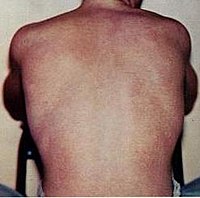
Photo from wikipedia
Natural reservoir hosts can sustain infection of pathogens without succumbing to overt disease. Multiple bat species host a plethora of viruses, pathogenic to other mammals, without clinical symptoms. Here, we… Click to show full abstract
Natural reservoir hosts can sustain infection of pathogens without succumbing to overt disease. Multiple bat species host a plethora of viruses, pathogenic to other mammals, without clinical symptoms. Here, we detail infection of bat primary cells, immune cells, and cell lines with Dengue virus. While antibodies and viral RNA were previously detected in wild bats, their ability to sustain infection is not conclusive. Old-world fruitbat cells can be infected, producing high titres of virus with limited cellular responses. In addition, there is minimal interferon (IFN) response in cells infected with MOIs leading to dengue production. The ability to support in vitro replication/production raises the possibility of bats as a transient host in the life cycle of dengue or similar flaviviruses. New antibody serology evidence from Asia/Pacific highlights the previous exposure and raises awareness that bats may be involved in flavivirus dynamics and infection of other hosts.
Journal Title: Cellular and Molecular Life Sciences
Year Published: 2019
Link to full text (if available)
Share on Social Media: Sign Up to like & get
recommendations!